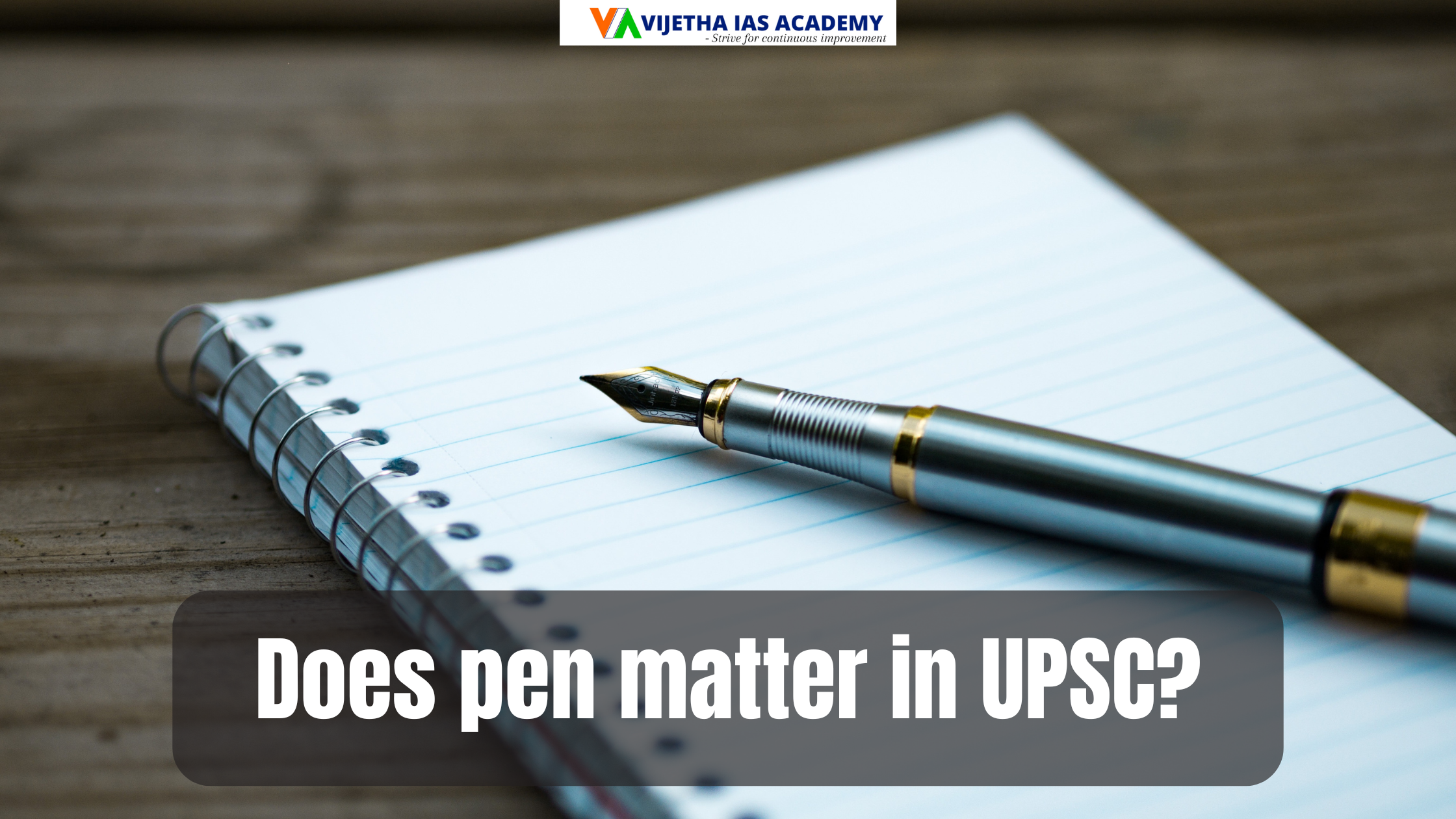
Does the Pen Matter in UPSC? Essential Insights for UPSC Aspirants by Vijetha IAS Academy
Introduction
The UPSC journey is as much about the big decisions—like choosing the right optional subject or coaching—as it is about the small ones, like selecting the best stationery. While the choice of pen may seem trivial at first, it directly influences your writing speed, neatness, and overall presentation.
In exams like UPSC, where every detail matters, using the wrong pen can lead to smudges, illegible handwriting, or even slower writing speeds—all of which can negatively impact your performance. When programs like the GS Foundation Course at Vijetha IAS Academy emphasize the importance of regular writing practice, they’re also indirectly stressing the value of using the right tools.
1. How the Pen Impacts UPSC Mains Exam
The UPSC mains exam requires aspirants to write multiple essays and answers over long hours, often testing their physical endurance as much as their intellectual capabilities. Here’s why your choice of pen matters:
Speed and Legibility
The pen you choose should glide effortlessly across the page without requiring excessive pressure. A slow or difficult pen can reduce your writing speed, while a blotchy or smudging pen might make your answers hard to read.
Presentation and Impact on Examiners
First impressions count. Clear, neat handwriting with consistent ink flow makes it easier for examiners to assess your answers positively. A poor-quality pen that leaks or fades can undermine even the best content.
Consistency During Long Writing Hours
Writing continuously for three hours in each paper can strain your hand. A pen with poor grip or awkward weight distribution can cause fatigue, potentially impacting your later answers.
2. UPSC Guidelines on Pens
The UPSC has specific rules regarding stationery for the prelims and mains exams. Following these guidelines is non-negotiable:
Specified Rules for Prelims and Mains
- Prelims: Use only a black ballpoint pen for marking answers in the OMR sheet. Gel pens are strictly prohibited.
- Mains: Blue or black ink is permitted. Either gel or ballpoint pens can be used, but the emphasis is on clarity and legibility.
What Happens If You Don’t Follow the Guidelines
Failing to adhere to these rules can lead to disqualification or rejection of your answer sheet. Always double-check the requirements mentioned in your admit card.
3. Features of a Good Pen for UPSC
Selecting the right pen involves more than just picking something off the shelf. Consider these features:
Smooth Writing and Flow
A good pen should allow seamless writing without interruptions or skips in ink.
Grip and Comfort
Opt for a pen with a soft grip, especially if you have to write for hours. This reduces strain and helps maintain handwriting consistency.
Ink Quality and Paper Compatibility
Ensure the pen you choose doesn’t bleed through or smudge on the paper used in UPSC exams.
4. Gel vs. Ballpoint Pens for UPSC
A common debate among UPSC aspirants is whether to use gel pens or ballpoint pens. Let’s break it down:
Pros and Cons of Gel Pens
- Pros: Smooth writing, vibrant ink, and better visibility.
- Cons: Higher chances of smudging and slower drying time.
Advantages of Ballpoint Pens
- Reliable for longer durations.
- Dries quickly and doesn’t smudge, making it ideal for exams.
5. Popular Pen Brands Among Toppers
UPSC toppers often swear by brands like Pilot, Reynolds, and Cello. Here are some affordable and reliable options:
- Reynolds Trimax: Smooth ink flow with a comfortable grip.
- Pilot V5: Excellent precision and vibrant ink.
- Cello Butterflow: Budget-friendly and long-lasting.
6. How to Test and Choose the Best Pen
Don’t wait until the exam to decide on your pen. Here’s how you can test and choose:
- Mock Tests with Different Pens: Use a variety of pens during mock exams to see which suits you best.
- Practicing Essay Writing: Test the pen’s comfort during long writing sessions.
7. Common Mistakes Aspirants Make
Avoid these mistakes to ensure a smooth writing experience:
- Using New Pens on Exam Day: Always use a pen that you’ve tested and are familiar with.
- Switching Pens Midway: This can cause inconsistencies in ink flow and presentation.
8. Practical Writing Tips for UPSC Mains
Improving your handwriting and writing speed can greatly enhance your performance:
- Enhance Legibility: Focus on clear and spaced-out letters.
- Write Consistently: Practice writing long answers under timed conditions during your preparation.
At the GS Foundation Course at Vijetha IAS Academy, such writing practices are part of their rigorous training programs.
9. The Role of GS Foundation Courses
Programs like the GS Foundation Course at Vijetha IAS Academy help aspirants hone their writing skills while preparing them with high-quality content. Their emphasis on frequent answer writing practice also teaches you to work efficiently with your chosen pen.
Conclusion
Yes, the Gs Foundation Course at Vijetha IAS Academy pen matters in UPSC, but not just for superficial reasons. It directly impacts your speed, comfort, and the quality of your answers. By testing various options and practicing consistently, you can ensure this small detail doesn’t become a roadblock in your journey to success.
FAQs
1. Can I Use Multiple Pens in the Mains Exam?
Yes, but it’s advisable to stick to one type of pen for consistency.
2. Which Ink Color is Permitted?
Only blue or black ink is allowed in UPSC Mains.
3. Are Gel Pens Better for Essay Writing?
Gel pens provide smooth writing but may smudge. Test them thoroughly before use.
4. What Pen Should I Use for the Prelims OMR Sheet?
Only black ballpoint pens are permitted for marking answers.
5. How Does Vijetha IAS Academy Help with Writing Skills?
The GS Foundation Course at Vijetha IAS Academy offers regular answer writing practice, ensuring aspirants master the art of presenting their thoughts effectively.
